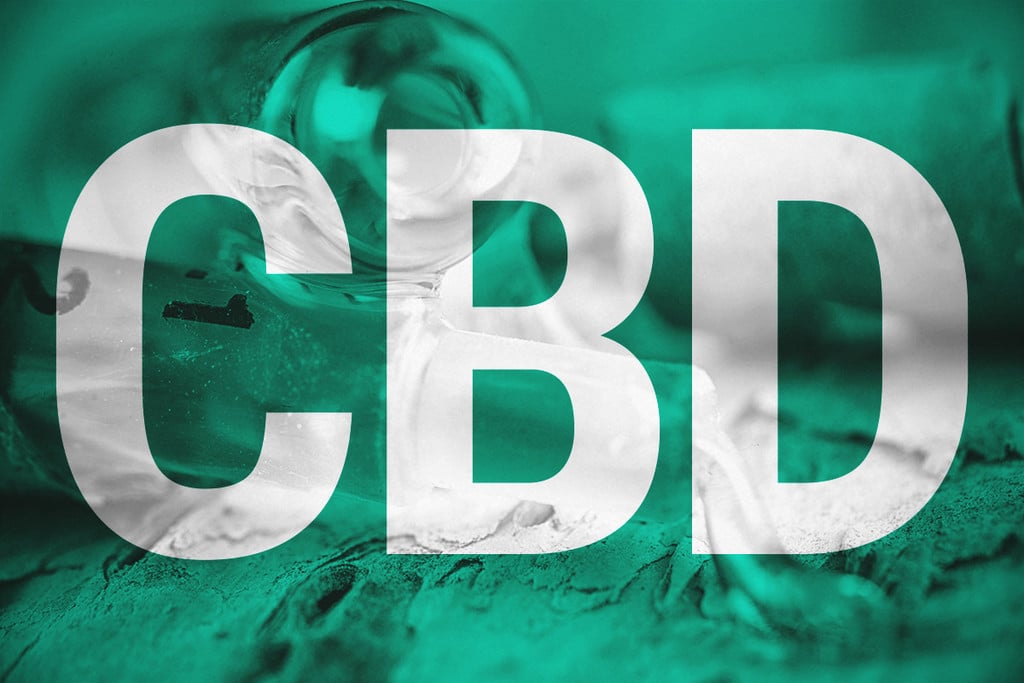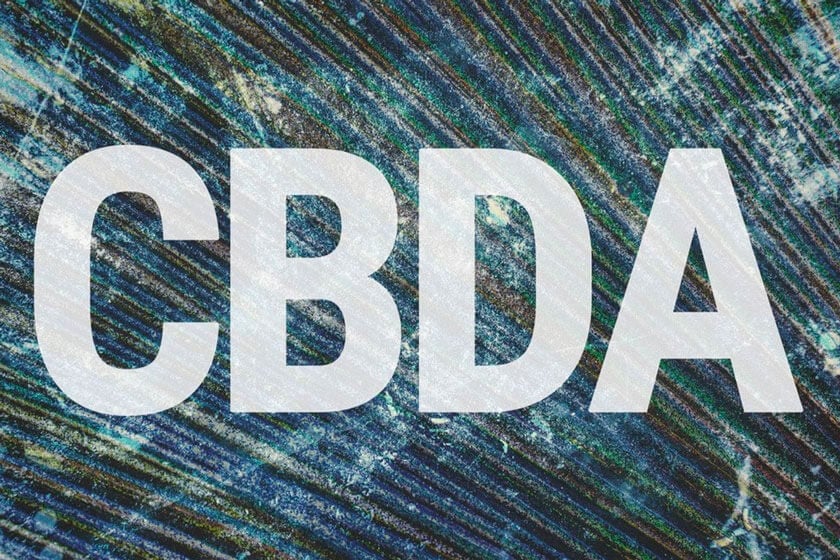.
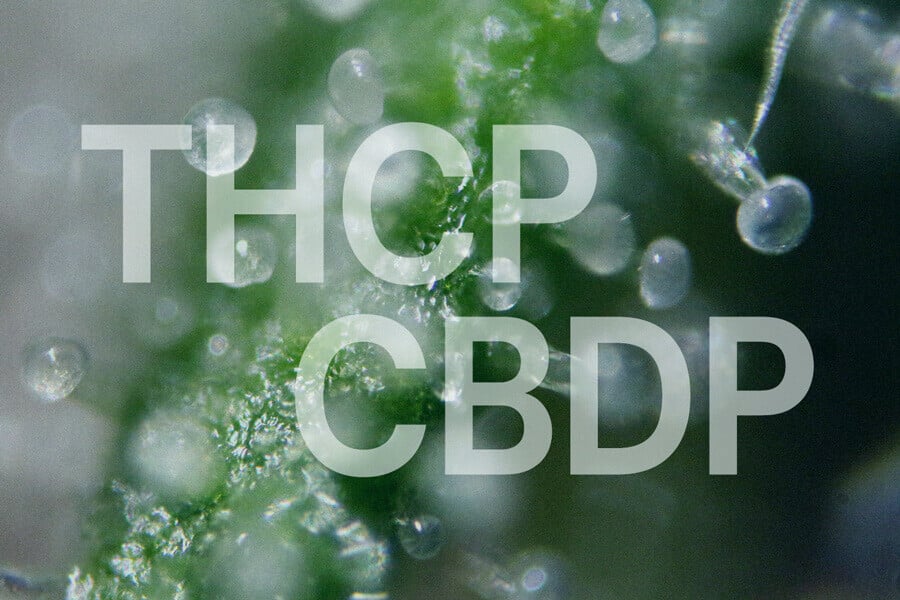
THCP and CBDP: A Comprehensive Guide to Two New Cannabinoids
Cannabis plants contain much more than THC and CBD. In 2019, researchers discovered two new chemicals among the hundreds found in the plant: THCP and CBDP. Both of these novel compounds show great potential in the world of weed, with THCP exhibiting 30 times the potency of THC. Continue reading to discover their chemistry and effects.
Contents:
- What are thcp and cbdp?
- How thcp and cbdp work in the endocannabinoid system
- Thcp: the “longer” thc
- Comparing thcp to other cannabinoids: thc, thca, and delta-8-thc
- Does thcp get you high?
- Cbdp: what we know so far
- What are the potential therapeutic benefits of thcp and cbdp?
- Are there thcp-rich and cbdp-rich cannabis strains?
- Safety and dosing considerations for thcp
- What’s the role of thcp and cbdp in the future of cannabis?
It might come as a surprise to many cannabis users and non-users alike, but weed and THC are not synonymous. Rather, the cannabis plant produces hundreds of chemicals that influence its aromas, flavours, and physiological effects. While THC and CBD stand out as two of the most abundant molecules in modern strains, they’re far from the only constituents in their chemical class. So far, researchers have discovered around 100 unique cannabinoids in the plant[1]—and they keep finding more.
THCP and CBDP are among a group of recently elucidated cannabinoids that are changing the way scientists view cannabis chemistry. Continue reading as we share everything we know about this exciting pair of phytochemicals, from their effects to their potential impact on the global cannabis industry.

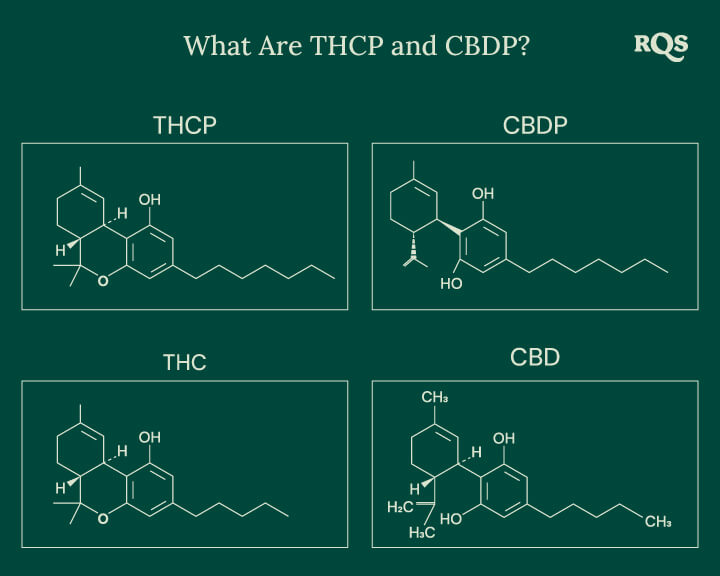
What Are THCP and CBDP?
As their initialisms suggest, both tetrahydrocannabiphorol (THCP) and cannabidiphorol (CBDP) share close chemical traits with THC and CBD, respectively. As homologues of these superstar cannabinoids, they possess similar structures and functional groups. These novel compounds belong to an ever-growing list of cannabinoids discovered in the marijuana plant. THCP shows promise in drastically increasing the psychoactive potency of cannabis as a whole, whereas CBDP could mimic the effects of its close counterpart, CBD.
While researchers are only just getting to grips with how they work in the body, the cannabis community has already expressed great interest in these cannabinoids. As a result, breeders are likely to start developing strains that express THCP and CBDP in higher concentrations to meet consumer demand.
-
Understanding Cannabinoids: A Brief Overview
Before we dive deeper into the discovery of THCP and CBDP, it’ll help to briefly define the structure and function of cannabinoids as a whole. Traditionally, researchers have defined[2] these compounds as structurally similar molecules that appear exclusively in the cannabis plant. However, this definition has since broadened to include a wide range of compounds capable of binding to endocannabinoid system (ECS) receptors, including phytocannabinoids found in other plants and mycocannabinoids found in fungi.
The ECS plays a crucial role in many biological processes, from nervous system firing and digestion to bone density and immunity, and consists of three fundamental parts: signalling molecules, receptors, and enzymes. The first of this trio are called endocannabinoids (“endo” meaning “within”). The two primary endocannabinoids are anandamide and 2-AG, which are tasked with activating the two chief ECS receptors, known as CB1 and CB2. Meanwhile, enzymes both build and break down endocannabinoids as and when the body needs them.
Interestingly, plant cannabinoids such as THC share molecular characteristics with our endocannabinoids, allowing them to bind to ECS receptors and influence both the ECS itself and the biological processes it manages. For example, THC produces psychoactive effects by binding to CB1 receptors in the central nervous system.
-
The Discovery of THCP and CBDP
The discovery[3] of both THCP and CBDP took place in 2019. A team of researchers from the University of Modena and Reggio Emilia, Italy set out in search of novel cannabinoids. They received 10 g of raw plant material of FM2, a strain used by the Military Chemical Pharmaceutical Institute for breeding. They divided the material into two batches, one consisting of 500 mg and the other of 9.5 g. They prepared an extract from the 500 mg batch using 50 ml of 96% ethanol alcohol before analysing it using a form of ultra-high-performance liquid chromatography (UHPLC). They then extracted cannabinoids from the 9.5 g batch by freeze-drying, applying hexane and sonification and spinning the formula in a centrifuge. Next, they filtered it and isolated cannabinoids using a type of liquid chromatography.
At the end of this process, the researchers managed to isolate newly discovered THCPA and CBDPA. Much like THC and CBD exist as the cannabinoid acids THCA and CBDA in raw cannabis, both THCP and CBDP exist in their acidic forms before heating and drying. The researchers decarboxylated both compounds, a process that uses heat to eject a carboxyl group, and ended up with THCP and CBDP.
How THCP and CBDP Work in the Endocannabinoid System
But their research didn’t end there. They then tested THCP for its potential influence on human CB1 and CB2 receptors as well as a computerised docking simulation. What they uncovered next has left both academics and cannabis users as a whole flabbergasted: THCP exhibited an affinity with the CB1 receptor 30 times greater than that of THC. From there, they looked for the cannabimimetic activity of THCP in an animal model and found that THCP produced the same kind of results and behaviours as THC but at lower doses. While it took a minimum of 10 mg/kg of THC to provoke a response in these tests, it took 5 mg/kg of THCP.
So, what about CBDP? Well, the researchers effectively left it for another team to play around with. Ongoing studies are currently investigating CBDP, but they reasoned that because CBD itself lacks binding affinity with CB1 and CB2 receptors, CBDP probably does too.
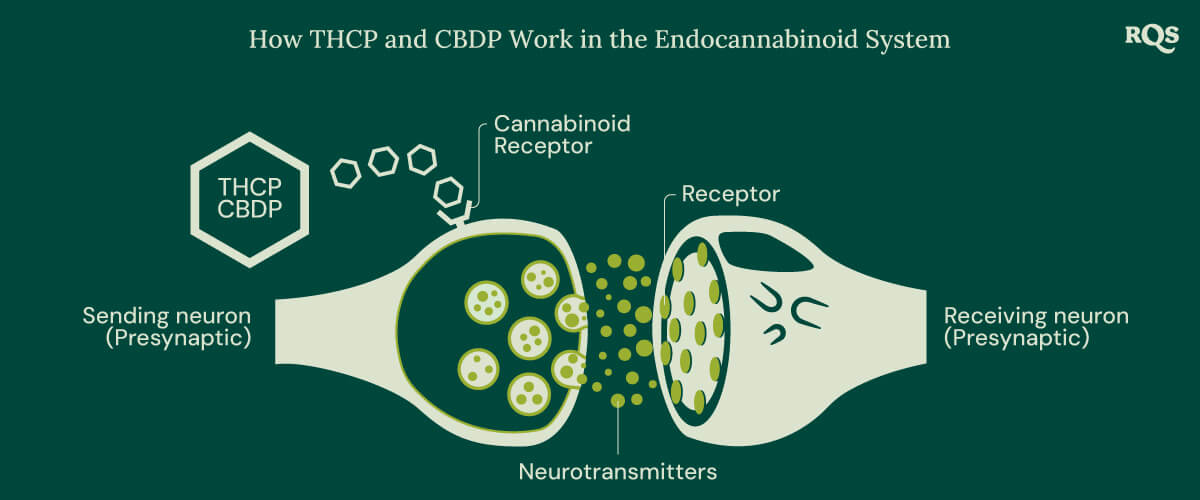
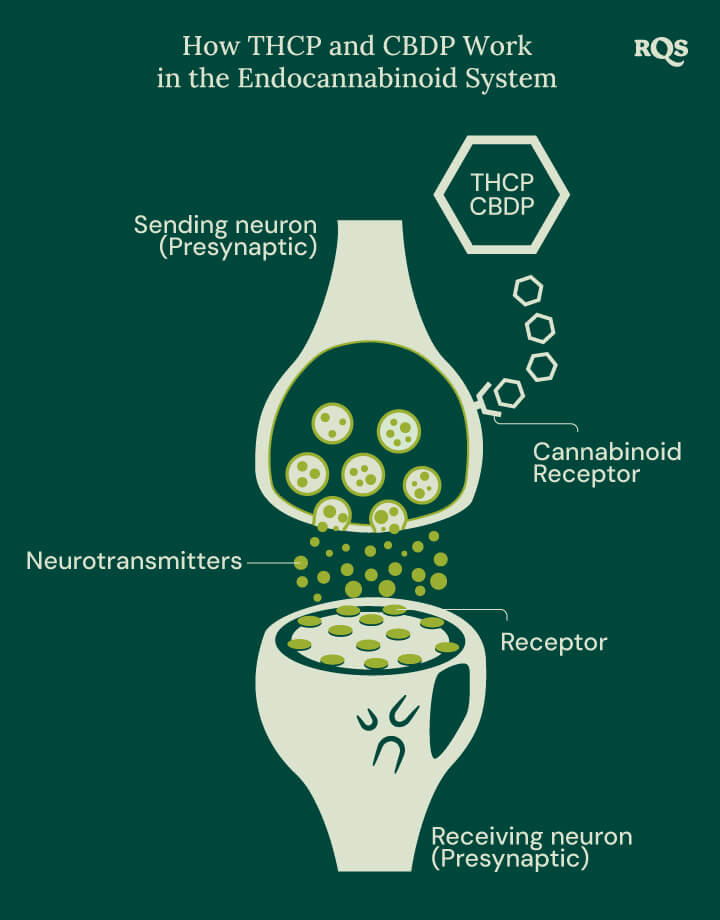
THCP: The “Longer” THC
You can view THCP as the “longer” version of THC, owing to differences in their chemical structure. When looking at a picture of a THC molecule, you’ll see a group of three rings and a tail. This tail, known as an alkyl side chain, features five carbon atoms. When looking at an image of THCP, you’ll notice it has a longer tail made up of a total of seven carbon atoms. Although it seems like a minor difference, this extended alkyl side chain is what causes THCP to bind to the CB1 receptor with a much greater affinity and produce much more potent psychoactive effects.
Comparing THCP to Other Cannabinoids: THC, THCA, and Delta-8-THC
Though THCP has a lot in common with its close molecular relatives, its unique chemical structure makes it distinct from these compounds. Find out how they compare below.
-
THCP vs THC: What’s the Difference?
Because research shows that THCP possesses around 30 times the affinity with CB1 as THC, it has the potential to produce a much more powerful effect in smaller amounts. However, saying that a strain with 10% THCP would get you thirty times higher than a strain with 10% THC isn’t entirely accurate, as the effects of cannabis aren’t contingent on just one or two chemicals. With that said, THCP certainly appears to induce a far more potent experience, and its presence in some cannabis strains, although small, could underpin why you’ve felt much more stoned than normal on some occasions.
Researchers are now in the process of uncovering the therapeutic potential of the molecule. Logically, it makes sense that, through its action on CB1, THCP could help to address medical conditions that THC-rich strains are currently prescribed for in some areas of the world. Scientists will likely focus on areas already studied[4] in the context of THC, including pain, appetite, neuroprotection, and nausea and vomiting.
-
THCP vs THCA: Psychoactivity and Therapeutic Potential
Tetrahydrocannabinolic acid (THCA) is the chemical precursor to THC found in raw cannabis flowers. Once exposed to heat, THCA converts into THC. THCA itself has a low binding affinity with both CB1 and CB2 receptors, with THC exhibiting a 62-fold greater affinity[5] with CB1. Therefore, considering that THCP binds with 30 times greater affinity than THC, the former cannabinoid absolutely dwarfs the activity of THCA at this receptor—a cannabinoid acid that is largely viewed as non-psychotropic. However, THCA influences human physiology in different ways, leading researchers to launch studies[6] assessing its effects on inflammation, immunity, and cancer.
-
THCP vs Delta-8: Which Is Stronger?
Delta-8-THC occurs naturally in cannabis, but in much smaller concentrations than THC. Though very chemically similar to THC, it features a double bond on the eighth atom of its carbon chain as opposed to the ninth. Research[7] suggests that delta-8 possesses around 50–75% of the potency of THC, making it considerably weaker than THCP.
Does THCP Get You High?
As a newly discovered molecule, human trials on THCP have yet to take place. However, scientific modelling that shows how the cannabinoid interacts with CB1 receptors suggests that THCP exerts a much stronger effect than THC. Some products labelled to contain THCP have made their way onto the market, and anecdotal accounts describe the effects as potent, relaxing, and euphoric.
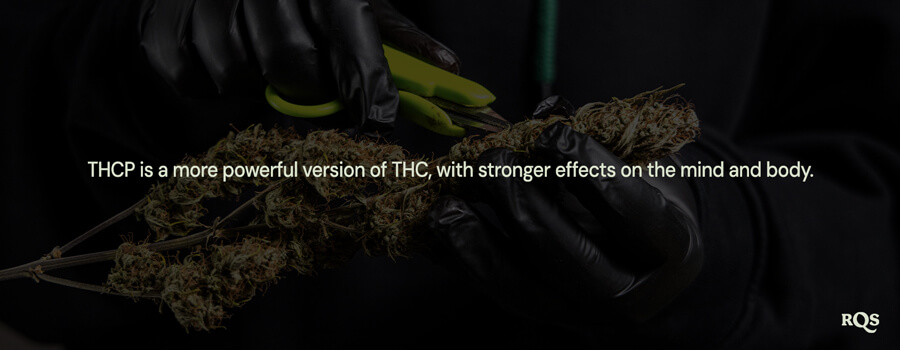
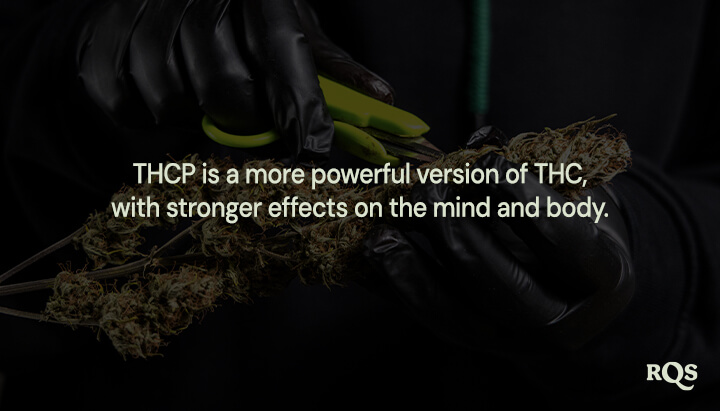
CBDP: What We Know So Far
Little information exists about how CBDP impacts the endocannabinoid system or the body as a whole. Studies[8] have shown that the molecule, much like CBD, lacks significant affinity with both CB1 and CB2 receptors. However, scientists are keen to test it on other receptors belonging to the “expanded” ECS, including TRPV1 and GPR[9] receptors.
-
How CBDP Compares to CBD
Similar to THC and THCP, the structural differences between CBD and CBDP boil down to their side chains. While CBD has a 5-carbon pentyl group, CBDP has a 7-carbon heptyl group. Future studies will likely uncover just how much of a difference this makes regarding the effects of these cannabinoids in the human body.
-
Is CBDP Psychoactive?
Because CBDP is not an agonist of the CB1 receptor, it is unlikely to produce euphoric or inebriating effects. However, as CBD binds to other receptor sites linked to mood, including serotonin and dopamine receptors[10], it’s possible that CBDP is psychoactive in a way that doesn’t inhibit normal functioning, much like CBD. That said, more research is necessary to determine whether CBDP shares this mechanism of action.
What Are the Potential Therapeutic Benefits of THCP and CBDP?
Right now, the potential therapeutic benefits of both THCP and CBDP are unconfirmed. However, research continues to explore the role of THC in pain[11], neuroprotection, and nausea, while CBD is studied in models of anxiety, insomnia, and inflammation. Because of their structural similarities to THC and CBD, THCP and CBDP are likely to also be studied in models of these conditions. Time will tell just how effective these cannabinoids may be.
Are There THCP-Rich and CBDP-Rich Cannabis Strains?
Both THCP and CBDP occur in cannabis naturally, but only in very small concentrations. At present, there are no commercial strains that produce high quantities of either cannabinoid. However, as with other discoveries in cannabis science, we can expect breeders to latch onto this trend and produce varieties high in both cannabinoids in the not-too-distant future.
Safety and Dosing Considerations for THCP
Because of the lack of human trials and information on how the body metabolises THCP, no safety or dosing guidelines exist. Therefore, it’s best to take a cautious approach when using any product believed to contain this cannabinoid. Consider the effects of a high-THC strain, then remember that THCP binds to the CB1 receptor with 30 times the affinity. In short, take things one hit at a time.
-
THCP’s Side Effects
Though the exact side effects of THCP in humans remain unknown, they are likely to be very similar to those produced by THC, albeit potentially stronger. These include:
- Dry mouth
- Red eyes
- Hunger
- Rapid heart rate
- Intense anxiety or paranoia
- Impaired short-term memory
- Lethargy
What’s the Role of THCP and CBDP in the Future of Cannabis?
THCP and CBDP have an extremely bright future in the cannabis industry. Given its potency, THCP will likely gain popularity in the world of dabs and extracts. And though we know little about CBDP at this point, future studies will determine how best to put this cannabinoid to use. Prepare to see a boom in product diversification and new strains centred around these novel compounds. Sign up for our newsletter to keep up with emerging findings!
- Cannabinoids - Alcohol and Drug Foundation https://adf.org.au
- Cannabinoids: Definitional ambiguities and a proposal https://www.sciencedirect.com
- A novel phytocannabinoid isolated from Cannabis sativa L. with an in vivo cannabimimetic activity higher than Δ9-tetrahydrocannabinol: Δ9-Tetrahydrocannabiphorol | Scientific Reports https://www.nature.com
- Therapeutic Potential of Cannabis: A Comprehensive Review of Current and Future Applications - PMC https://pmc.ncbi.nlm.nih.gov
- Affinity and Efficacy Studies of Tetrahydrocannabinolic Acid A at Cannabinoid Receptor Types One and Two - PMC https://pmc.ncbi.nlm.nih.gov
- Critical Review and Novel Therapeutic Perspectives of Δ9-Tetrahydrocannabinolic Acid A https://www.liebertpub.com
- Delta-8-THC: Delta-9-THC’s nicer younger sibling? | Journal of Cannabis Research | Full Text https://jcannabisresearch.biomedcentral.com
- CBD Versus CBDP: Comparing In Vitro Receptor-Binding Activities - PMC https://pmc.ncbi.nlm.nih.gov
- Possible Receptor Mechanisms Underlying Cannabidiol Effects on Addictive-like Behaviors in Experimental Animals - PMC https://pmc.ncbi.nlm.nih.gov
- Therapeutic Effects of Cannabis and Cannabinoids - The Health Effects of Cannabis and Cannabinoids - NCBI Bookshelf https://www.ncbi.nlm.nih.gov


























